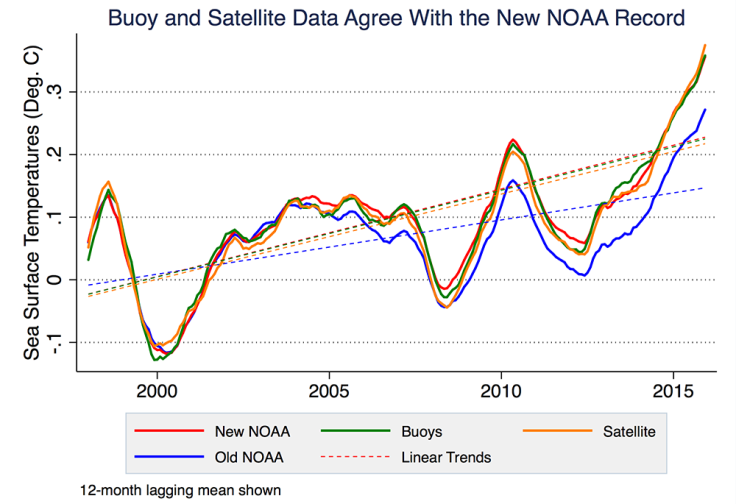Global Warming 'Hiatus' Never Happened, New Study Confirms

Several times over the past decade, climate change deniers have pointed to a so-called "hiatus" in global warming between 1998 and 2014 and used it to argue that climate change is a hoax. After all, the existence of a hiatus — or, more accurately, a slowdown in global mean surface temperature over the past 15 years — was acknowledged even by the Intergovernmental Panel on Climate Change in a 2013 report.
How, the denialists questioned, can scientists say human activities are causing the Earth to heat up when the data shows a clear slowdown?
The answer, according to a new analysis published Wednesday in the journal Science Advances, is that the hiatus — or even a slowdown in the rate of ocean temperature rise — never happened. The study reveals that measurements that showed the existence of such a slowdown were, in fact, the result of a "cold bias" creeping into data gathered by ocean buoys.
"In the grand scheme of things, the main implication of our study is on the hiatus, which many people have focused on, claiming that global warming has slowed greatly or even stopped," lead author Zeke Hausfather, a graduate student in UC Berkeley, said in a statement. "Based on our analysis, a good portion of that apparent slowdown in warming was due to biases in the ship records."
Much before scientists started using satellites and floating ocean buoys to measure ocean temperatures, ship-based sensors were used to carry out the task. The problem with using ship-based sensors is that they can introduce a "warm bias" into the readings, as it involves measuring the temperature of engine intake water.
So, in the 1990s, scientists switched to ocean buoys. Currently, 85 percent of National Oceanic and Atmospheric Administration's (NOAA) ocean temperature readings come from buoys. However, buoys introduce the opposite bias in data — they produce a colder measurement than thermometers on a ship's engine-intake valve would.
For years, NOAA failed to account for this cold bias in its dataset, and meshed together the readings collected from the ships and the buoys. This is how the so-called hiatus came to be.
"Only a small fraction of the ocean measurement data is being used by climate monitoring groups, and they are trying to smush together data from different instruments, which leads to a lot of judgment calls about how you weight one versus the other, and how you adjust for the transition from one to another," Hausfather said. "So we said, 'What if we create a temperature record just from the buoys, or just from the satellites, or just from the Argo floats, so there is no mixing and matching of instruments?'"
Upon doing so, the researchers found that oceans had warmed at 0.12 degrees Celsius per decade over the past two decades — nearly twice the previous estimate of 0.07 degrees Celsius, and in line with NOAA's 2015 estimate. This means that the upward trend seen in the last half of the 20th century — a period when humans started pumping massive quantities of carbon dioxide into the atmosphere — continued through the first 15 years of the 21st century.

The analysis lends further support to the findings of a 2015 study by researchers at NOAA — the first major study to call the slowdown an "illusion" created by artifacts of earlier analysis. After the study was published, its authors were subjected to what many scientific bodies said amounted to "harassment" by the Republican-led House committee on science.
"Our results mean that essentially NOAA got it right, that they were not cooking the books," Hausfather said.
The findings of the study come at a crucial time. Preliminary estimates indicate that in 2016, the global average temperature may have been up to 1.2 degrees Celsius higher than pre-industrial levels — bringing the planet perilously close to breaching the Paris climate agreement’s perhaps unrealistic target of limiting the rise to 2 degrees Celsius. Scientists have also voiced concerns over what may be in store for 2017, as U.S. President-elect Donald Trump — who once called climate change a hoax “created by and for the Chinese in order to make U.S. manufacturing non-competitive” — vowed, during his campaign, to “cancel” the historic climate treaty.
"Global warming is happening, it never stopped, it never paused, and the models have gotten it right," climate scientist John Abraham, who studies ocean temperatures, wrote for the Guardian. "Now let’s move on to solving the problem."
© Copyright IBTimes 2024. All rights reserved.






















